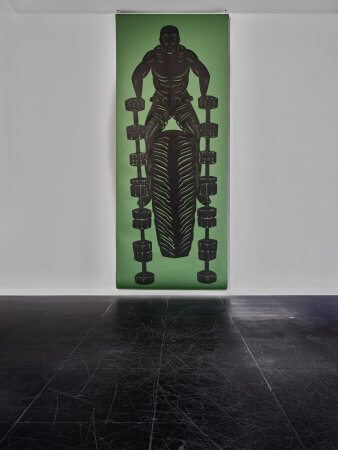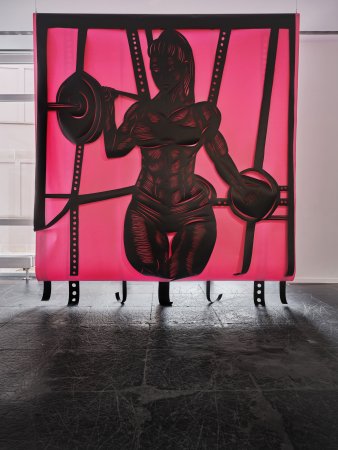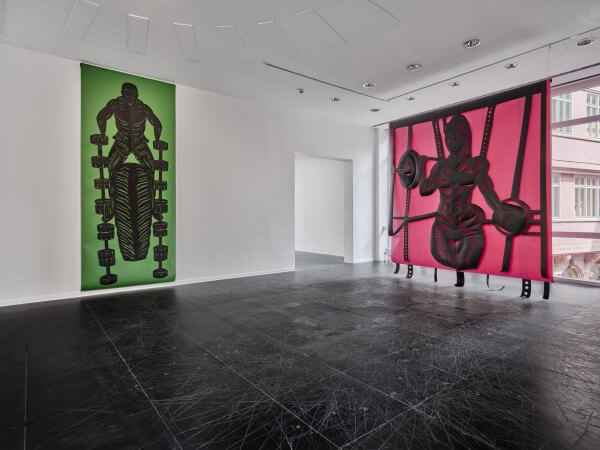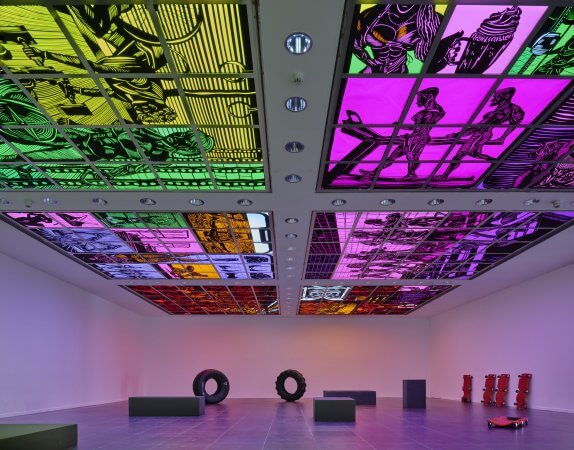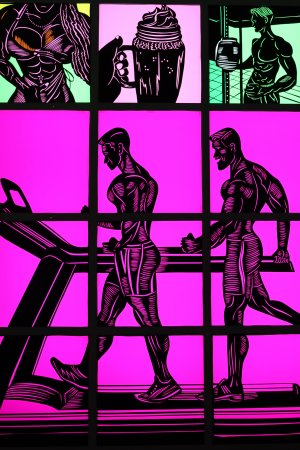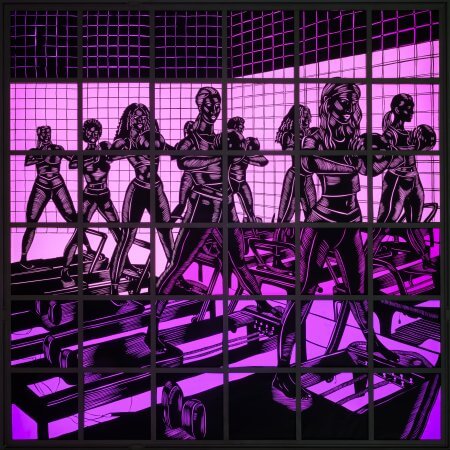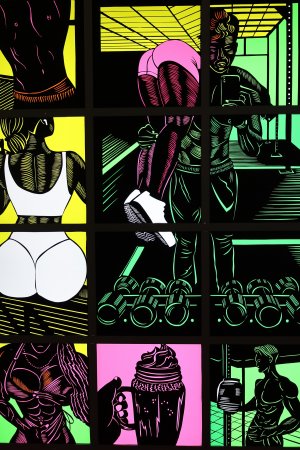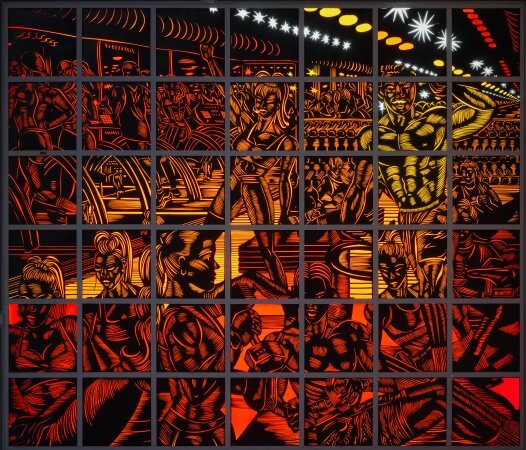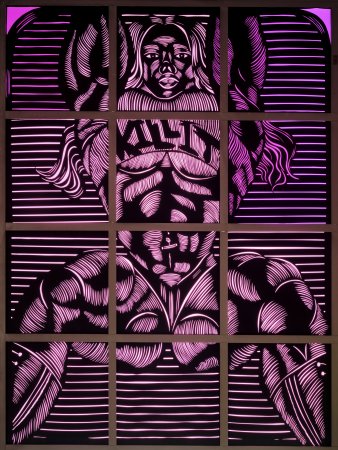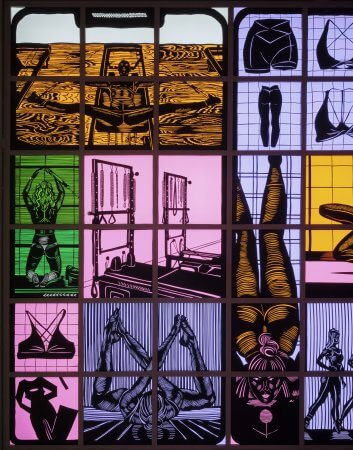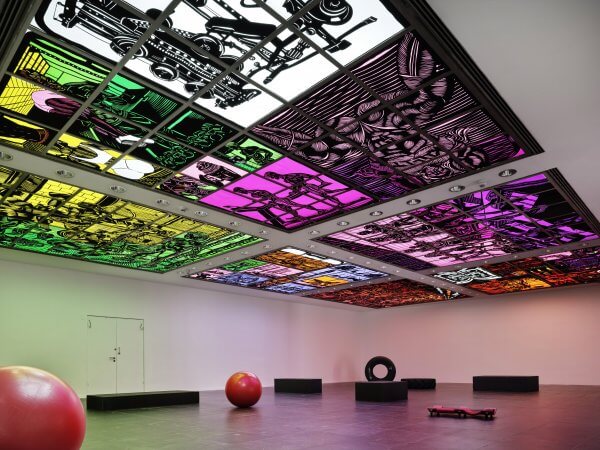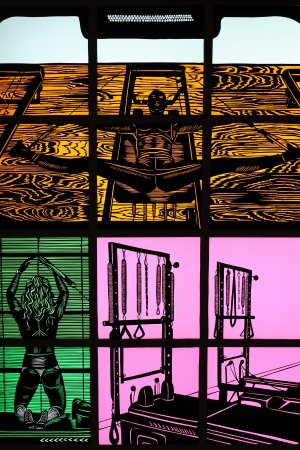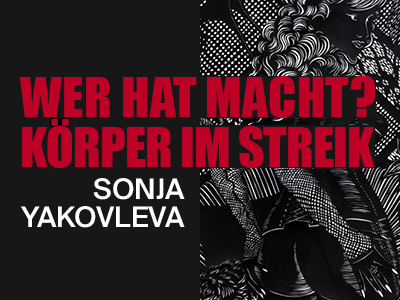Sonja Yakovleva, INSTAREXIE, Gym Bro und Pink sexy gym boot camp
Gym bro, 2024
Paper Cut, Photo cardboard
110 x 318 cm
Pink sexy gym boot camp, 2024
Paper Cut, Photo cardboard
265 x 295 cm
Ohne Titel, 2024
Paper Cut, Photo cardboard
680 cm / ⌀ 47 cm
INSTAREXIE, 2024
Ceiling installation of 240 paper cuts, photo cardboard, color foil
je 68 x 68 cm
Courtesy the artist
Sonja Yakovleva has been perfecting the art of paper cutting for more than ten years, transferring this historical medium into the very present. She lives with intensity and, at the same time, is a chronicler of the present. Her view of the world, of people and of everyday culture is precise and lustful, noticing and collecting patterns of human behaviour that she captures in her drawings and condenses in her silhouettes. Her art is full-bodied and life-affirming — the contribution of an “embedded artist” — and she gives an independent account of contemporary pop culture, for which she immerses herself into current events.
For this exhibition at the Frankfurter Kunstverein, Sonja Yakovleva has focussed her attention and her extensive research on new areas. All the works in the exhibition have been newly created and developed as a monographic presentation across three rooms. It is the power of the body that the artist examines: on the one hand, the body as a mouldable material for the self-presentation on social media and, on the other, the body of those who go on strike in urban spaces.
Yakovleva opens the exhibition with oversized figures from the cult of the body that is so prevalent in the world of fitness: Gym bro und Pink sexy gym boot camp. These two silhouettes, one male and one female, strike a muscle flexing pose — bodies from the CrossFit world — bigger than life, muscular, strong and sculpted.
Sonja Yakovleva creates her motifs somewhere between documentary and fiction, between her own practice, extensive research in the studio, Instagram fitness feeds and prompted fantasies, which she then condenses into her papercuts. She sifts through digital imagery in the various echo bubbles of online culture and filters out images that she uses as material. Her instinct for iconographic elements and cultural symbols that characterise our times is unmistakable.
Self-optimisation and self-presentation of the body have always been human endeavours. In online culture, beauty filters have shifted beauty ideals by exaggerating individual features in such a way that people adapt their real bodies to their digital image, giving rise to a zeitgeist phenomenon: Snapchat dysmorphia.
In the world of fitness, everyone becomes a sculptor and image producer of their own body and its depiction. In Germany alone, gym memberships are growing by 10% per year. And currently, revenues of more than 5.44 billion euros have been generated for the industry by more than 11 million people.
Sonja Yakovleva’s work celebrates physicality from the very beginning. The contrast between highly contemporary motifs and historical techniques, which she has been perfecting for years, is her recognisable trademark. And she manages to translate images from fast-moving online culture into meticulous, handmade papercuts that are extremely time-consuming and labour-intensive.
In INSTAREXIE Yakovleva is creating her silhouette work as a ceiling installation for the first time. Six pictorial surfaces with a total of 240 tiles make up the monumental motif, with each one individually drawn, rescaled, transferred and cut out. A complex composition of contours and internal cuts. In this new, expansive installation, the central element is the body: the material of the optimised self. The ceiling areas display self-contained worlds of fitness with differentiated community aesthetics — Barry’s Bootcamp, Urban Heroes, Pilates Fused and countless more — boutique gyms that become themed stages. Here, people take to the stage and perform work on their own bodies, always under the watchful eye of others. The large mirrors, transparent glass facades and omnipresent mobile phone cameras not only serve as perfect settings for presenting the body, but they also serve as a means of self-control, comparison, motivation and competition. Everyone wants to showcase their own physical power and gain recognition for it, in a world where appearance is moulded by performance. Tell me which world of fitness you belong to and I’ll tell you who you are.
Yakovleva explicitly emphasises the institution-like character of fitness studios. In this multi-optional society, the human body is quantified, measured and monitored, and the wearable fitness watch is always measuring. The physique is not to be taken for granted, but is the result of willpower, discipline and labour.
The result is a neoliberal field of tension between voluntarism and submission, where performance requirements and conformity to an ideal image are internalised and exert power. The gym becomes a body factory: bodies are optimised, efficiency is increased, flexibility is a guiding principle, and strictness and toughness towards one’s own stamina are virtues. Working against your own limits is the overarching motto.
Sonja Yakovleva’s work reveals that every body bears traces of its social background and that the power relations of society are reflected in it. The frequency of visits to the gym is a status symbol, as is the choice of club. People go there every day, before and after work, especially in well-paid jobs where physical labour is no longer performed — so working out is a must. And statistics from 2017 show that Frankfurt is the city with the highest proportion of active gym-goers, especially in the premium segment.
Yakovleva practises boxing herself at Ibra Boxing in Frankfurt, and for this exhibition, she has tried out new forms of fitness to excess, capturing the essence of her observations in the silhouette paintings. Ass Ass Ass is a dominant element — the female ass as an icon. Brazilian butt lifting has become the most practised procedure worldwide. It epitomises the male gaze and its objectification of the female body and, at the same time, symbolises neoliberal postfeminism — autonomous, free to make decisions and entrepreneurial. Yakovleva’s works are provocative in that her images quote sexist representations, but were created in an attitude of liberated empowerment. The self-optimisation of the body in fitness culture is hard work; working in your free time, following some inner imperative, promises social recognition and participation through the perfect body.
Yakovleva’s monumental visual worlds condense and compress, quote and caricature her observations, as she looks at the new generation of believers celebrating the collective rituals of a fitness cult with humour and irony. She portrays the places where bodywork is practised fanatically and where performance is quantified by coaches, headset commands and precise intervals. Or she focuses on the stretchability of the ideal body in minimalistic Pilates worlds with smoothies and food bowls. Yakovleva’s gaze is unsparing and sensual at the same time; however, she never places herself above her figures, but gets fully involved with them.

